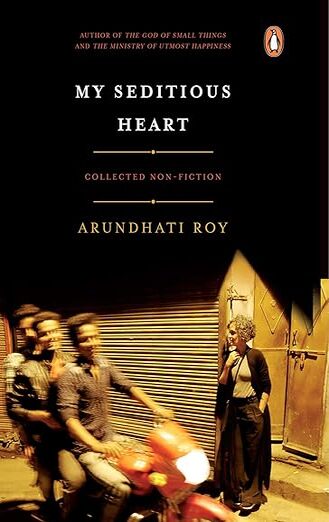My Seditious Heart is a collection of essays by Arundhati Roy over the past two decades. The essays are on a wide variety of subjects but the crux of all is social justice for the marginalized, calling out the governments for their flawed, unsustainable, and anti-people policies and a passionate appeal for humanity. Through her essays, she has opened a discussion space Justice, human rights, freedom of speech.
The book has around 40 essays about India’s nuclear test, Narmada Bachao Andolan and people affected by the project, tribal people of central India, Kashmir, Naxalites, Dalits, dissent, religious extremism, and much more. Deep research combined with eloquence, wit, sarcasm, and empathy each essay is informative and a delight to read.
The essay “Greater Common Good” is detailed and backed up by meticulous research about the Narmada Project, which has displaced lakhs of people in Gujrat, Maharashtra, and Madhya Pradesh. The readers will get to know some mind-boggling details, which are seldom discussed, debated, or written in the mainstream media.
“Over the last fifty years, India has spent 87,000 crore on the irrigation sector alone. Yet there are more drought-prone areas and more flood-prone areas today than there were in 1947. Despite the disturbing evidence of irrigation disaster, dam-induced floods, and rapid disenchantment with green revolution (declining yields, degraded land), the government has not commissioned a post-project evaluation of a single one of its 3,600 dams to gauge whether or not it has achieved what it set out to achieve, whether or not the (ever phenomenal) costs were justified, or even what the costs actually was.”
The essay also sheds light on the condition of the people displaced (usually the tribals, Dalits, and poor) by the project. It is sad and frustrating to read how the government handled the rehabilitation of these displaced people. It was like adding salt to the injury. First, they are uprooted from the villages they have lived in for centuries, and second, the delayed and botched-up rehabilitation process.
“When it comes to rehabilitation, the government priorities are clear. India does not have a national rehabilitation policy. According to the Land Acquisition Act of 1894 (amended in 1984) the government is not legally bound to provide a displaced person anything but cash compensation. Imagine that. A cash compensation, to be paid by the Indian government officials to an illiterate male Adivasi (the women get nothing) in a land where even the postman demands a tip for delivery!”
Roy’s sharp and penetrating writing makes readers think. Each essay is captivating and informs the readers much more than what is on the surface. The essays take the readers beyond the obvious with some hard-hitting facts backed up by proof. Her essays take the state head-on, speaking for the people who are not heard. She points out to the flaws so that they can be fixed (it never happens though).
The essays advocate the right to dissent, the right to free speech, and the right to debate and discuss. The author does not shy away from writing and speaking on matters which were/are considered as anti-national. She is very vocal in her views on Kashmir, Naxalites, crony capitalism, custodial deaths, illegal detentions, Dalit atrocities, and increasing religious bigotry. Through her essays, she chronicles the history of the times and forewarns us about the dangers of keeping quiet.
